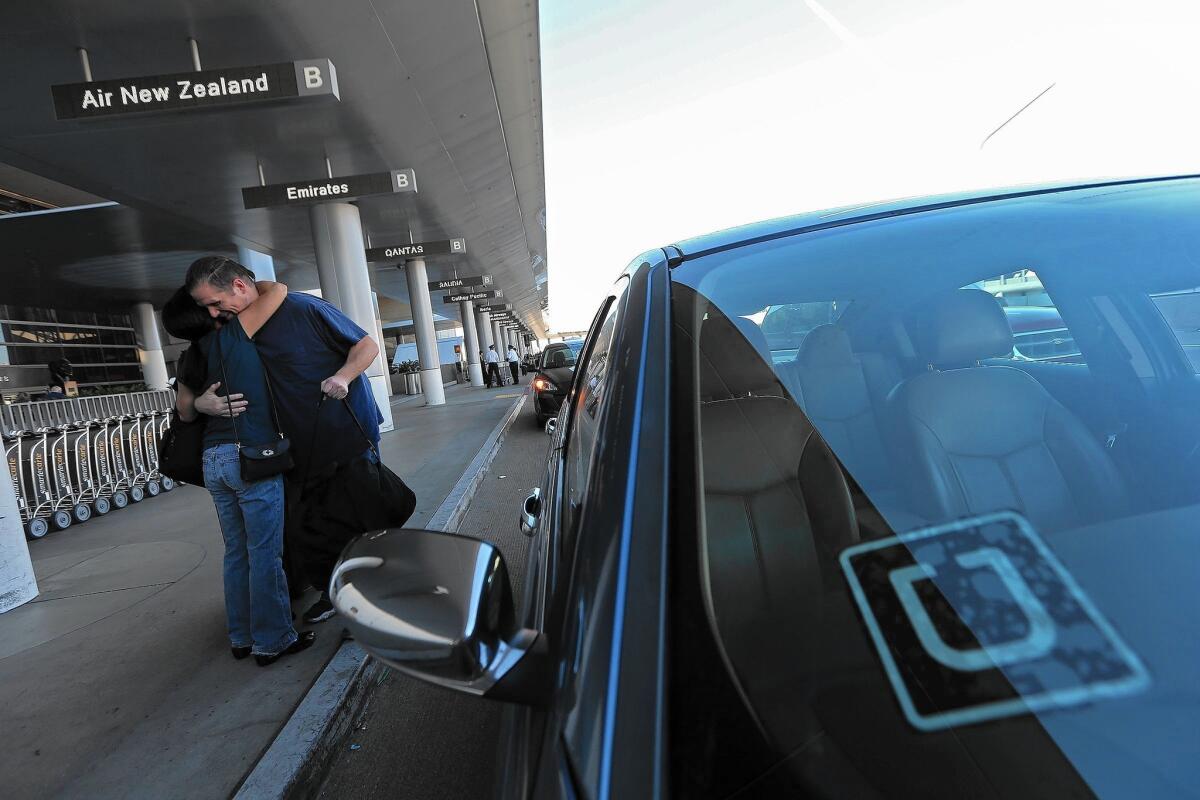What’s holding up the start of Uber and Lyft pickups from LAX?

The sticking point to Uber and Lyft starting to pick up passengers at LAX has been access to the ride-sharing firms’ operational information. Above, an Uber driver drops off a passenger at LAX.
- Share via
During his annual State of the City address in April, Los Angeles Mayor Eric Garcetti hinted that the logistical nightmare of getting home after a flight into Los Angeles International Airport would soon become easier.
“By this summer, at my direction, ride-share companies like Uber and Lyft will be able to pick you up at the airport,” Garcetti said. The promise drew some of the loudest applause of the night.
But summer came and went, and travelers at LAX still can’t go home using Lyft or UberX. Drivers and travel-weary passengers have begun to wonder: What’s taking so long?
As it turns out, cementing an agreement between Silicon Valley start-ups and a major bureaucracy can take far more than two months. The initial timeline of “by this summer” has become “by Thanksgiving,” sources familiar with the permit process say, and could even become “by the end of the year.”
As in other parts of the United States where the young businesses operate, the sticking point at LAX has been access to operational information. Airport staff are in back-and-forth negotiations with Uber and Lyft, asking for data and documents that clarify whether the companies can meet all the terms of their airport contracts. That process has taken more than a month.
“We’ve asked for the documents,” airport spokeswoman Nancy Castles said. “If they don’t turn them in, we can’t review them.”
She declined to comment on which documents LAX is still waiting for, saying she would prefer to “just finish the process first and announce that it’s done.” But, she added, working with Uber and Lyft has taken “top priority” for airport staff members.
Uber has put “a tremendous amount of time and effort into what has been an extensive application process,” a spokesman for the ride-share firm said in an email. The company submitted the first half of its application in September, confirming that it is licensed to operate in California. The second half of the application, containing insurance agreements and vehicle permits, should be filed by the end of the day Tuesday, Uber said.
Lyft, meanwhile, submitted its full application in mid-September. A spokeswoman said the company hopes “to enter into permanent operations soon.”
Before the permit process began, airport officials spent the first half of the summer wrangling with ride-share representatives over what rules their drivers should be required to follow. Then the City Council intervened in July, spending a month debating whether Uber and Lyft drivers should undergo the same background checks as their taxi competitors.
After the airport has received the necessary documents, city lawyers will review the agreements and green-light the permits if all is in order.
The permits cannot be approved until the City Council resolves an appeal filed by a Westside activist group, the mayor’s office said.
In August, the Alliance for a Regional Solution to Airport Congestion filed an appeal under the California Environmental Quality Act, asking elected officials to study how Uber and Lyft would affect airport congestion before approving any permits.
“Every time the airport starts working on a good project, they turn it into something terrible,” said Denny Schneider, the group’s president. “I don’t believe that ... the airport will be able to keep track of these drivers.”
The appeal was rejected by a City Council committee this month, and will go before the full council in coming weeks.
“We are optimistic that the City Council will complete all pending proceedings swiftly and that the ride sharing companies will successfully obtain licenses to operate at LAX as soon as possible,” Garcetti spokeswoman Connie Llanos said in an email.
Uber, in particular, is known for pushing back against requests for driver data that it considers private. In July, an administrative law judge recommended that California fine Uber $7.3 million and suspend its operations across the state for failing to provide required data. That includes information showing that the company provides equal access to all customers in all ZIP Codes.
Uber has since submitted those data and has appealed the suspension, a Public Utilities Commission spokeswoman said.
LAX regulators want to be able to determine and verify how many passengers are picked up and dropped off in the airport’s central terminal area by the ride-share firms. Unlike taxis, Uber and Lyft drivers would have to drop off and pick up on the upper departure level, a requirement the companies opposed because riders would have to haul their luggage upstairs from baggage claim areas.
NEWSLETTER: Get the day’s top headlines from Times Editor Davan Maharaj >>
The LAX permits would also mandate a $4 fee for each pickup or drop-off. That charge, which would probably be passed on to passengers, would go to the airport’s general operating budget.
The companies must demonstrate that their apps would contain drivers within a specified holding area until they received a request for a ride. No more than 40 drivers would be allowed in the holding area at one time.
The regulations would also require Uber and Lyft to add a digital “geofence” to their mobile apps, which would prevent drivers from receiving fares if they are not in the digital waiting area. That system, similar to one in place at San Francisco International Airport, would also record some basic data on drivers.
Follow @laura_nelson for more transportation news.
ALSO
Black Lives Matter’s disruptive tactics test L.A. leaders
Mixed feelings greet homeless population at Sylmar strip mall
Brown’s veto disappoints opponents of one-size-fits-all Asian label
More to Read
Sign up for Essential California
The most important California stories and recommendations in your inbox every morning.
You may occasionally receive promotional content from the Los Angeles Times.











